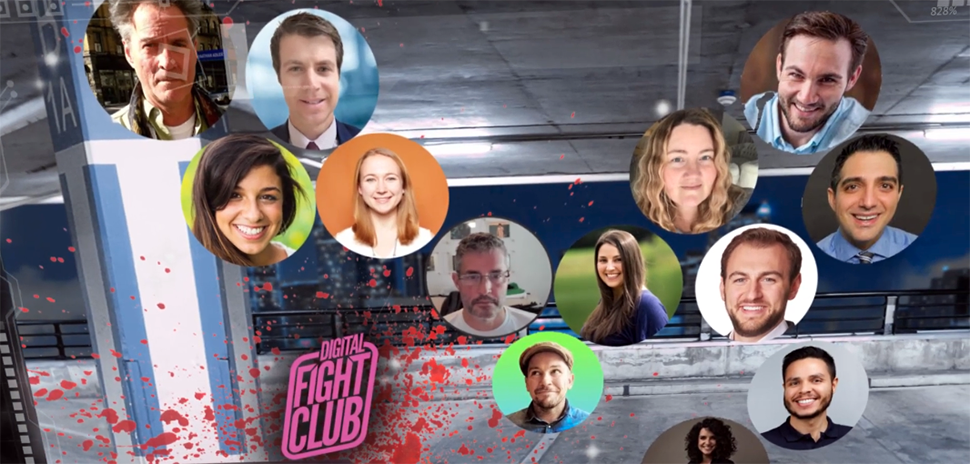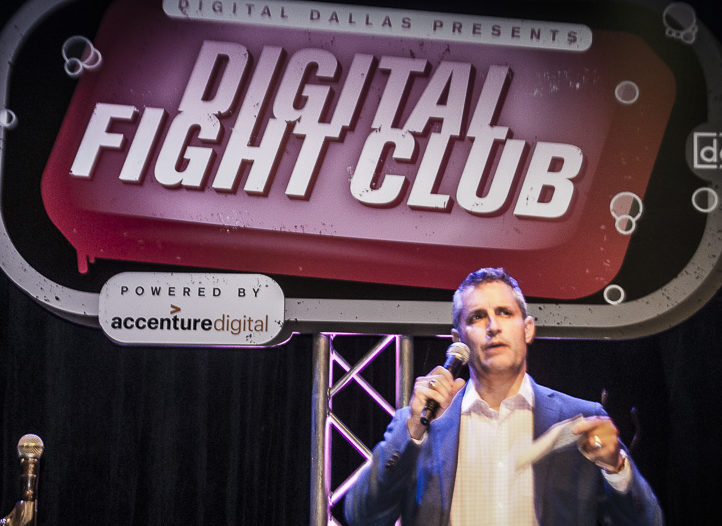
Michael Pratt, founder of Digital Dallas, emceed Wednesday’s event at the Granada Theater in Dallas. [Photo: Jewels Clark]
From driverless cars to artificial intelligence, bright minds squared off on today’s hottest tech topics in the boxing ring at the Digital Dallas Fight Club event Wednesday at the Granada Theater on Greenville Avenue.
The “fights” pitted experts on both sides of the issue debating in lightning round fashion before a packed house of more than 450 people. The audience and a team of referees, including billionaire Dallas Mavericks owner Mark Cuban, voted on the winner in each round.
Here are some highlights and the results from the second annual Fight Club event:
DRIVERLESS CARS: SHOULD HUMANS TAKE THEIR HANDS OFF THE WHEEL?
Mike Courtney, a futurist at Aperio Insights, came out swinging in favor of driverless cars. He was the first winner of the night.
“I can already save 10,000 lives,” Courtney said. “Based on math, I’ve already won the debate.”
“I can already save 10,000 lives.”
Mike Courtney
He cited Google and other tech companies that are running billions of simulations and the fact that sensors are getting cheaper by the day.
He squared off against Mark Haidar, CEO of Vinli, who advocated in favor of the human brain rather than a machine. For one, the human brain can adapt to situations it hasn’t seen before, he said.
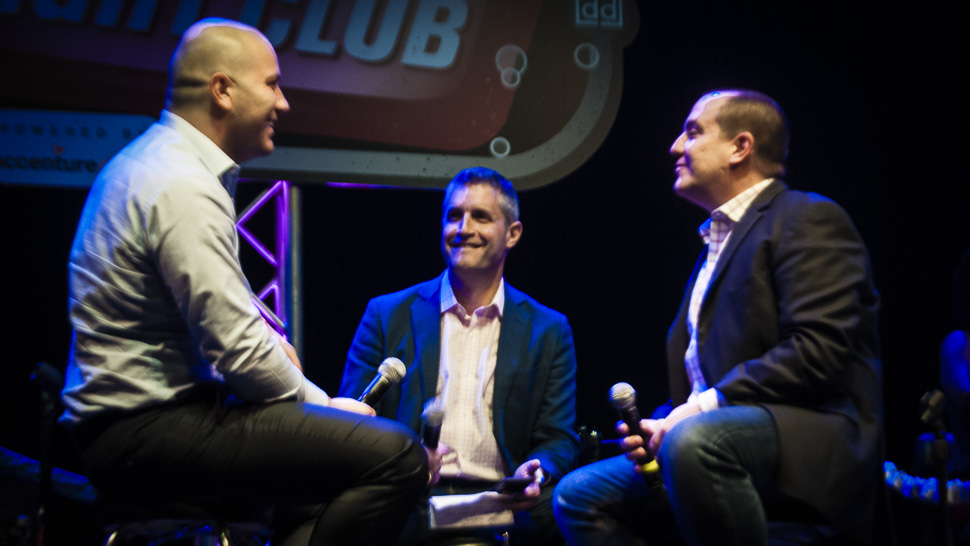
Mike Courtney (right), a futurist at Aperio Insights, was the first winner of the night with his pro stance on driverless cars. [Photo: Jewels Clark]
“The technology is not there to make it safer than a human being,” Haidar said. “Autonomous cars are being driven in a very controlled environments. The human being is more capable of making complex moral decisions.”
WILL THE DIGITAL ON-DEMAND WORKFORCE REPLACE TRADITIONAL OFFICES?
Today’s office space is anything but traditional or conventional, but it’s still a necessity, said Nick Clark, founder and CEO of Common Desk. Coworking space gets startups, entrepreneurs, and freelancers out of the home or coffee shop and into a community of people, Clark said.
“I need a community of people to collaborate with.”
Nick Clark
“I need a community of people to collaborate with,” Clark said. “I need people to connect with. Once they signup, they get plugged into the community.”
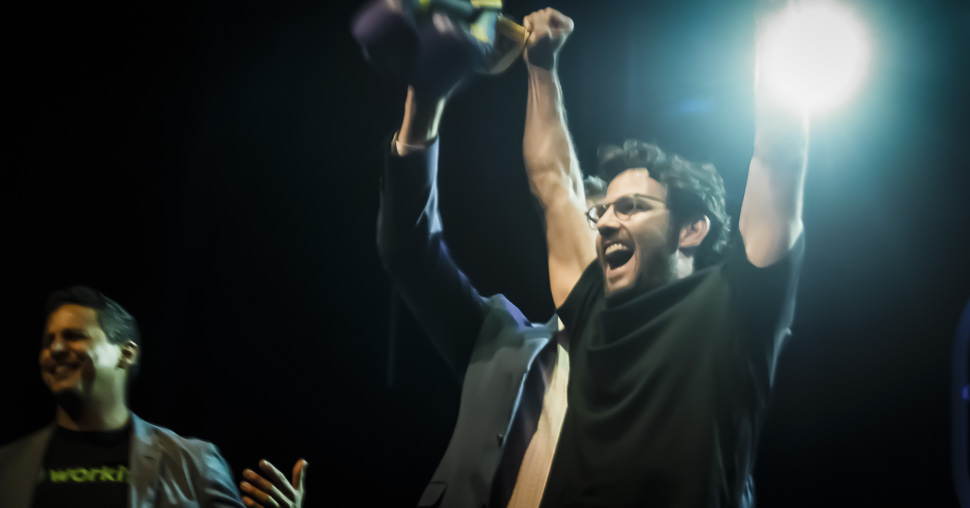
Nick Clark, founder and CEO of Common Desk, won his fight in saying that physical office space is not obsolete. [Photo: Jewels Clark]
Clark won the fight against Stephen Huerta, CEO of Workify, who argued that cloud computing makes the physical office obsolete.
“The reality is you can do everything you want to do digitally,” Huerta said. “The modern workplace is over 100 years old. The key to keeping the modern employee engaged is that there’s got to be flexibility.”
Clark countered by saying that productivity goes down and laziness goes up if people work in the home.
DIGITAL STORYTELLING: WHO CONTROLS THE NARRATIVE?
Urvashi Pitre, president of Tasseologic, started the fight off by saying companies need to listen to what consumers want. And there are plenty of ways to listen. At the end of the day, the company can control the narrative and give consumers what they need.
“Every brand that’s using data well is listening,” Pitre said. “The consumers are leaving you bread crumbs. If I couldn’t predict behavior I’d be out of a job.”
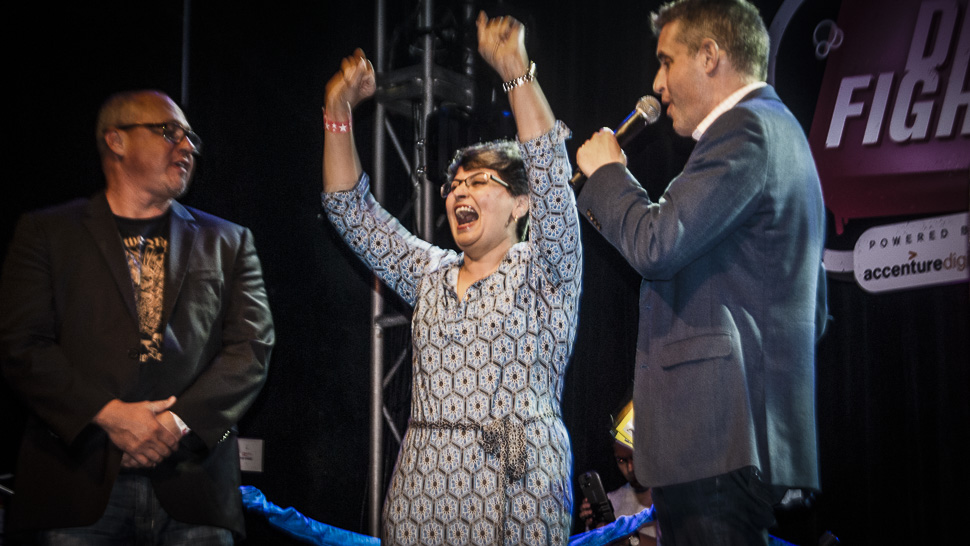
Urvashi Pitre (middle), president of Tasseologic, celebrates her win. [Photo: Jewels Clark]
“The consumers are leaving you bread crumbs. If I couldn’t predict behavior I’d be out of a job.”
Urvashi Pitre
Pitre won her fight against Shon Rathbone, CEO of 3Headed Monster, who argued that consumers are empowered today.
“Modern corporations need to learn that their actions speak louder than their words,” Rathbone said, referring to the United Airlines social media debacle after a passenger was dragged off the airplane.
WHO WILL CONTROL SMART HOMES?
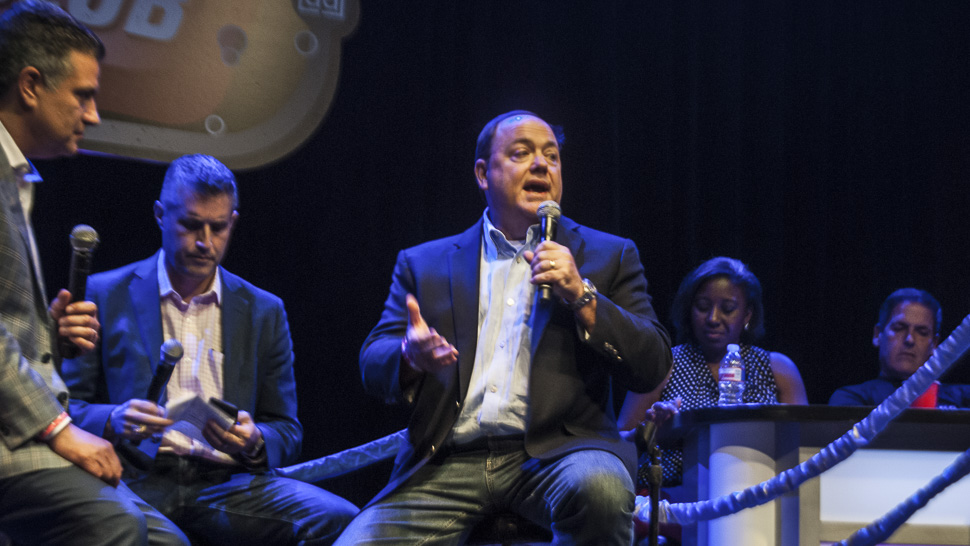
Stuart Sikes (right), vice president of business development and strategy for People Power Company, says at the end of the day legacy internet providers hold the cards for smart homes. [Photo: Jewels Clark]
Smart home devices such as Nest Thermostats and Alexa have connected houses to the Internet of Things, but at the end of the day, the legacy internet service providers will hold the cards, said Stuart Sikes, vice president of business development and strategy for People Power Company.
“Most people can’t afford a fancy custom solution like StarPower provides,” said Sikes, a jab at his opponent Dan Pidgeon, who founded StarPower.
While it does take legacy companies longer to innovate, the end result will be a platform that’s so easy a grandmother could use it, Sikes said.
Sikes won the fight against Pidgeon.
Pidgeon’s main argument was that the legacy internet service providers aren’t trusted or liked by consumers. The real innovations will be driven by Facebook, Amazon, Google, and others.
“You already see pieces of that coming together,” Pidgeon said. “It won’t be ISPs. It won’t be legacy companies. It will be new innovators on the block.”
ARTIFICIAL INTELLIGENCE: DOES IT THREATEN OUR VERY EXISTENCE?
Mankind has never backed down from innovation and that’s never stopped technology from advancing. It will be no different with artificial intelligence, said Dave Copps, CEO of Brainspace.
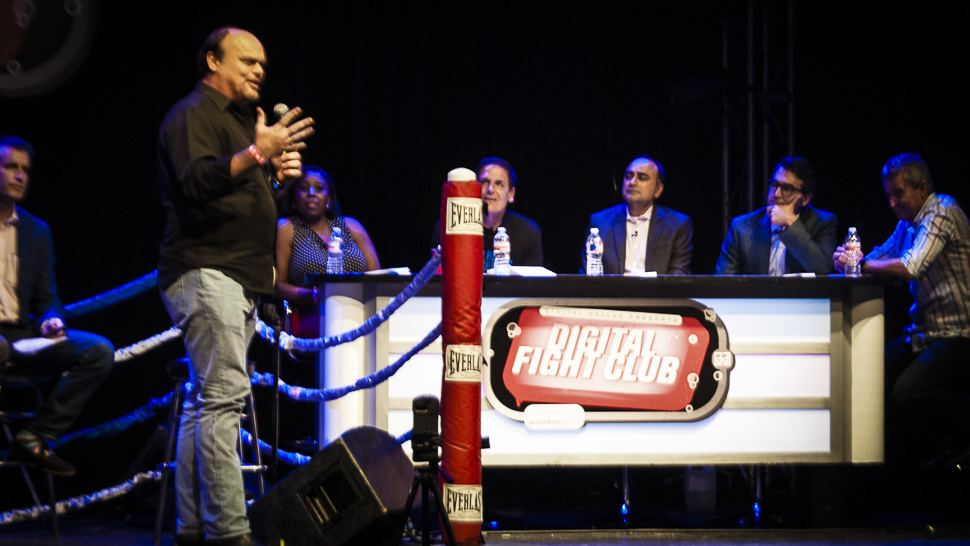
Dave Copps, CEO of Brainspace, says we should’t fear artificial intelligence, but rather embrace it’s potential. [Photo: Jewels Clark]
“We have the power to eliminate hunger, poverty, reinvent a broken education system, medicine, communicate with insurance and send drugs to your home,” Copps said. “It’s nothing to fear. We’ve been here before. We don’t know what jobs we’re going to create.”
“It’s nothing to fear. We’ve been here before. We don’t know what jobs we’re going to create.”
Dave Copps
He won the fight versus Raju Kattumenu, CEO and founder of Oculus360.
Cuban had the line of the night saying AI will know that a tomato is a fruit, not a vegetable. But will it know not to put a tomato in a fruit salad?
Copps acknowledged that AI has a ways to go in learning and consciousness. It needs to be able to identify images, pick up on patterns and cultural differences.
But big data is everywhere and AI can take that in at an astronomical rate, he said.
“Systems can learn from that data,” he said.
Kattumenu argued that right now AI is mostly used to sell advertisements and has the overall intelligence of a young child.
Dallas Innovates, every day
One quick signup, and you’ll be on the list.
View previous emails.


